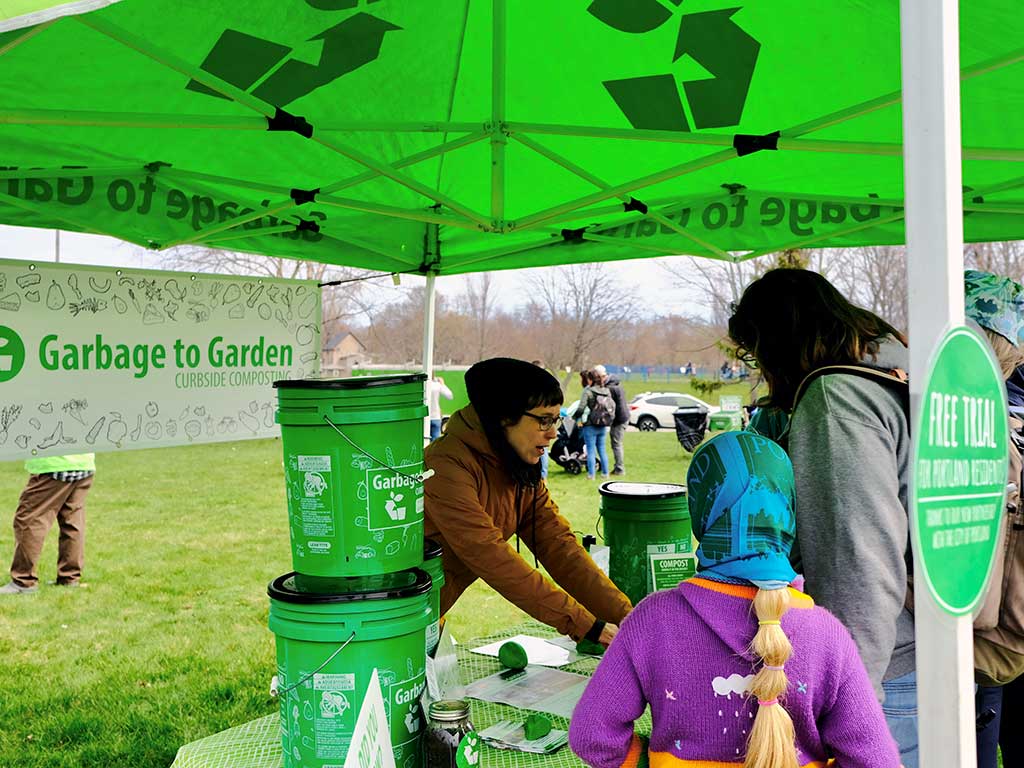The Green Bucket
By Colin Monahan
On April 1st, the City of Portland partnered with local composting service Garbage to Garden, effectively ending the city’s previous food waste collection service relationship with Agri-Cycle. As Portland’s official composting partner, Garbage to Garden will collect food scraps from a variety of municipal buildings, including Portland schools, City Hall, and the Barron Center. Additionally, the City of Portland will receive 40 yards of compost for public use in parks, schools, and community gardens.

Currently, Garbage to Garden offers three tiers of composting service to the public.
Portland residents may drop off their compost at eight public collection sites free of cost. Garbage to Garden will pick up your compost curbside on collection day and deliver a bag of compost weekly for a standard fee. Lastly, they will collect food waste with no delivery of compost for a subsidized rate.
Katie Tims, a sustainability associate with the City of Portland, is excited that Portland is beginning to address waste reduction. “[Garbage to Garden] will save you money. It will make your trash smell less bad. You will start to think about how much food you throw away and waste less food. Maine is one of the most food insecure states in the country, especially when it comes to child food insecurity. If you’re throwing away food, just think of hungry Mainers,” said Tims.
On average, 1 in 4 children in Maine is at risk of hunger, according to the Maine Department of Education. Additionally, 1 in 10 households in all of Maine are food insecure, according to the U.S. Department of Agriculture. Of those food insecure Mainers, one-third reside within just two counties, Cumberland and Penobscot county.
The City’s public composting partnership is a step towards fulfilling Portland and South Portland’s joint sustainability agenda, One Climate Future. The City’s joint climate action plan is already setting high expectations: reducing 70% of food waste in the trash stream by 2040, all municipal electricity use met by renewable energy by 2032, creating a bike network plan by 2026 with 5% of all travel completed by bike by 2040, amongst other goals.
Efforts have been made on the state level to address food waste and hunger.
In 2018, Sen. Craig Hickman (D-Kennebec) sponsored a bill that strengthens liability protections for food donors, provides tax credits to Maine farmers who donate food, and creates a commission that meets to develop strategies to reduce food waste.
An alarming testimony in support of the bill to the Natural Resources Council of Maine found that “forty percent of the food produced for human consumption in the United States is wasted every year… The 133 billion pounds of food that’s wasted annually in the U.S. could fill Gillette Stadium more than 700 times. This wasted food is worth more than $160 billion, and 97% of it ends up in landfills, where it breaks down anaerobically and produces millions of pounds of methane gas, which is more damaging to the climate than even CO2…” Hickman’s bill has since been enacted.
Annika Schmidt, Garbage to Garden’s Marketing Director, is excited that this new partnership will incentivize Portland residents to learn about their personal food waste. “We estimate that one family composting for three years will divert one ton of food scraps from the landfill. That really speaks to the volume of that simple individual choice to sort our food scraps,” said Schmidt. Currently, about 23% of Portland residents compost, far short of the city’s goal of 50% composting participation.
Compost for Gardens
Garbage to Garden is currently working with the Commercial Paving and Recycle Company in Auburn to process customer’s food scraps and produce compost for gardening. Subscribers can request one 2.5-gallon bag of Maine Organic Farmers and Gardner’s Association approved organic compost per week.
Free 1-Month Composting Service
Currently, Garbage to Garden is offering a free one-month trial to any Portland resident. Residents can continue to earn free service by referring their friends. Or volunteer with Garbage to Garden for two hours per month. Garbage to Garden’s composting services are available to residents from Cape Elizabeth to Bath.

Colin Monahan is a community organizer, server, and journalist. His previous work has focused on social movements in Chile, Cuba, Mexico, Vermont, New Hampshire, and Georgia. Colin believes in accessible, independent, local journalism.






1 Comments
Pingback: Bright Ideas: Curbside and neighborhood composting - The West End News